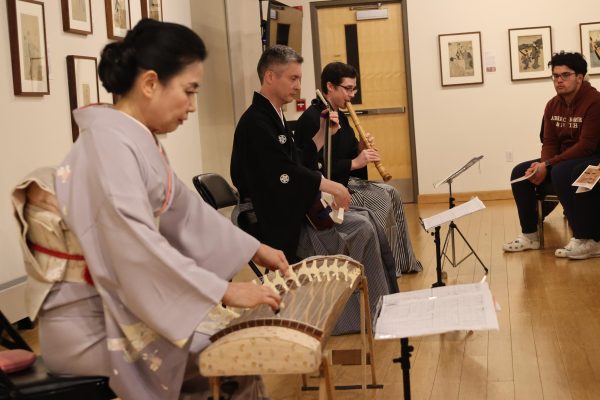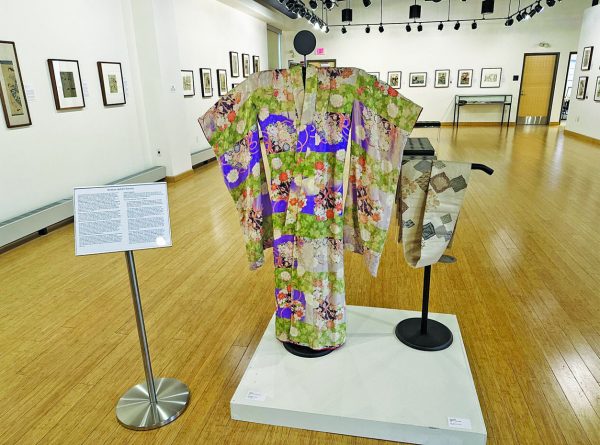Shakespeare Garden Shows Ultimate Beauty
October 3, 2016
Change isn’t always evident in things we pass every day, such as the Shakespeare Garden, as gardener Barbara Soyka, points out.
Soyka, a Penn State Master Gardener and speaker and chair woman of the Back Mountain Bloomers, which is a community organization that promotes gardening, said she tried to plant mint, but it was too invasive. But the marigolds are staying.
“We like to use the gold for Misericordia, because of it’s colors being blue and gold. Shakespeare also knew about it. Marigolds refer to the Virgin Mary, because they’re ‘Mary’s gold,’” said Soyka.
The Bloomers tend to the university’s Shakespeare Garden. They are also the ones responsible for the selection of plants, which is constantly changing.
“We intend on keeping the herb garden, but we sometimes change the herbs that are planted. For example, we used to plant mint but it became too invasive,” said Soyka.
One-hundred, seventy-eight plants in the garden are varieties mentioned in William Shakespeare’s works, but the garden has been planted with as many as 278. Soyka’s favorites are the red and white roses which reference the struggles between the the House of Lancaster and the House of York. They also pay tribute to the red and white Tudor rose, which was Queen Elizabeth I’s rose, who was Shakespeare’s queen.
Aside from the addition or subtraction of plants, the Shakespeare Garden has shrubs, trees and bushes that are constantly growing and adding shape to the garden, as Dr. Rebecca Steinberger, professor of English, notices every time she visits.
“The plant life is always evolving, such as the hydrangeas which have grown into this gorgeous hydrangea wall. It’s just beautiful,” said Steinberger.
Members of the campus community regularly see Steinberger in the garden for both business and pleasure. Recently, she brought her University Writing Seminar for a plant life tour as a way to enhance her students’ ability to incorporate vivid language into their writing.
“We went outside and talked about how to incorporate different language into our writing and took in the vivid landscape of the Shakespeare garden. Everyone was able to write something. It doesn’t matter how many times you’ve been in the Shakespeare garden, you always discover something new here,” said Steinberger.
Steinberger realizes that the garden is more than just a pretty place on campus. It’s also a retreat, a place where students can escape their daily problems. It is a place to clear the mind, breathe in fresh air, and listen to the babbling water of the two fountains.
“One of the best things about it is that you don’t have to you know Shakespeare to get a lot in one trip to the garden,” said Steinberger.
Students such as sophomore English major Daniella Amendola and senior philosophy pre-doctor of physical therapy major Jacob Schweiger often go to the garden to do homework, read and get away from hectic campus life.
“The Shakespeare garden is my favorite place on campus, because of the atmosphere. It feels like I’m in a movie or a fairy tale when I’m in here, and I like how you don’t see the full garden until you’re in it,” said Amendola.
“It’s a quiet place to study, read or think. I really enjoy the little fountains, so I usually sit on the bench between them, because when I read they’re good background noise to drown out anything else going on around me,” said Schweiger.
Justin Matzoni, junior sports management major, doesn’t visit the garden very often, but he recalls one time he did and what effect it had on him.
“One time last year I wasn’t having the best of days, and that night I walked around campus to find something that could cheer me up, and I came upon the Shakespeare garden. I sat on one of the benches, looked up at the sky and stars and said all of my problems and left them float up into the air. I encourage anyone to go there who may need to get something off their chest,” said Matzoni.
Many students and faculty have their own reasons for visiting the garden, including Savannah Schools, a senior physical therapy major, who enjoys visiting every Tuesday and Thursday to not only relax, but people-watch.
Dylan Reedy, a senior marketing and business administration major, simply appreciates how straight the hedges are.
“I was walking by the Shakespeare garden one day, and I couldn’t help but notice how straight the hedges are. They did a great job at lining them up. It’s like a fence of hedges and it’s absolutely perfect,” said Reedy.
Dr. Hunter Manasco, professor of speech pathology, takes advantage of the geographical placement of the garden. He found a seat there because it was the prefect place to see into a room in the library in which he wasn’t sure whether or not he had a meeting.
President Botzman, who can see the garden through the window of his office, is also a fan of the space.
“Before he came here, while he was visiting with the previous president he wondered why the old president always looked out the window and then when he got the office himself he realized he was looking at the garden,” said Soyka.
The woman behind the Shakespeare garden was Agnes Cardoni, a 1969 graduate and co-author of “At The Edge of Centuries,” a history of the university from 1913 to 1999. Cardoni was a student of Sister Regina Kelly, in whose honor the garden was named. Kelly was Cardoni’s mentor, and a lover of Shakespeare and his works.
“Sister Regina Kelly died in 2001, and I was bereft and very sad. Since we were very close, I was trying to figure out what to do as a memorial to her, and it came to me that a garden would be a living text that would keep on growing and keep her memory alive and also Shakespeare’s memory alive since she was the preeminent Shakespeare scholar on campus for many decades,” said Cardoni.
Soyka was one of the first that Cardoni enlisted for help, and the Shakespeare garden would not have been possible without her help and that of many others, Cardoni said. All the benches in the garden were dedicated to Sister Kelly by those who had known and loved her.
“We loved one another. You grow very close to somebody with whom you’ve written a book. You know when she died I said to my husband that she was the only person who understood my mind and my husband said back ‘Of course, Agnes, she built your mind,’” said Cardoni.







